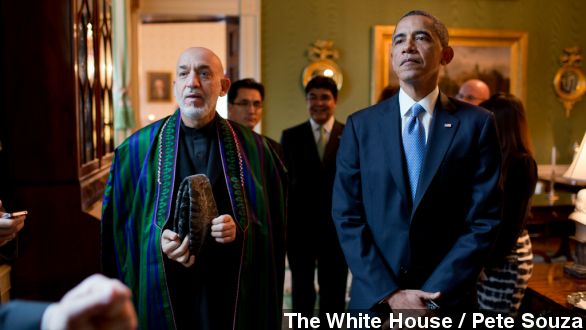With the Afghan and U.S. governments failing to reach a security agreement, The White House is, for the first time, telling the U.S. military to prepare for full troop withdrawal at the end of 2014.
The military and state department both support a plan keeping 10,000 troops, some of those NATO, in Afghanistan for training and security purposes. The White House is weighing options for 10,000 or 5,000 but now says zero will be the reality without agreement from Afghanistan's leaders to keep an American presence there. (Via CNN, NBC)
And, as of yet, Afghan President Hamid Karzai hasn't agreed. An election to replace him is set for April, so there is the possibility that the next president will have a different opinion.
And according to a White House statement summing up President Obama's call with Karzai Tuesday, the White House isn't ruling out working with a new Afghan leader. Obama said "Should we have ... a willing and committed partner in the Afghan government, a limited post-2014 mission focused on training, advising, and assisting Afghan forces and going after the remnants of core Al Qaeda could be in the interests of the United States and Afghanistan."
The president has consistently outlined what he sees as America's key goal in this 12-year conflict.
OBAMA: "The United States and our allies went to war to make sure Al Qaeda could never again use this country to launch attacks against us." (Via The White House)
But at least one senior official in neighboring Pakistan, speaking anonymously to CNN, believes Afghanistan will again be overrun with extremists if the U.S. leaves too soon. The official even "predicted that 30% of Afghan forces would desert if U.S. forces leave the country."
The War in Afghanistan has long been an unpopular one among U.S. citizens. A Pew Research Center poll last month suggests that sentiment hasn't changed: 52 percent of respondents considered both the Iraq and Afghanistan wars failures.


